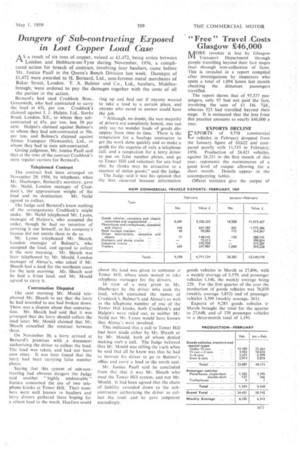Dangers of Sub-contracting Exposed in Lost Copper Load Case
Page 45

If you've noticed an error in this article please click here to report it so we can fix it.
A S a result of six tons of copper, valued at £1,472, being stolen between London and Hebburn-on-Tyne during November, 1956, a complicated action for breach of contract, involving four hauliers, came before Mr. Justice Paull in the Queen's Bench Division last week. Damages of £1,472 were awarded to H. Bernard, Ltd., non-ferrous metal merchants of Baker Street; London. T. A. Bulmer and Co., Ltd„ hauliers, Middlesbrough, were ordered to pay the damages together with the costs of all the parties in the action.
Bernard's had sued Craddock Bros., Greenwich, who had contracted to carry the load at 65s. per ton. Craddock's claimed against J. .1, Halpin, Ltd., Storks Road, London, SE., to whom they subcontracted at 65s. per ton, less 10 per cent. Halpin's claimed .against Bulmer's to whom they had sub-contracted at 50s, per ton, and Bulmer's claimed against Almac Transport (Newcastle), Ltd., to whom they had in turn sub-contracted.
Giving judgment, Mr. Justice Paull said that at the time of the contract Craddock's were regular carriers for Bernard's.
Telephoned Contract The contract had been arranged on November 29, 1956, by telephone, when. Mr. Hueherger, Bernard's secretary, gave Mr. Neild, London manager of Craddock's, the approximate weight of the load and its destination. Mr. Neild agreed to collect.
the Judge said Bernard's knew nothing of the arrangements Craddock's might make. Mr. Neild telephoned Mr. Lyons, manager of Halpin's, who accepted the order, though he had no intention of carrying it out himself, as his company's licence did not entitle them to do so.
Mr. Lyons telephoned Mr. Sheath, London manager of BuImer's, who accepted the load, and agreed to collect it the next morning. Mr. Sheath was later telephoned by Mr. Mould, London manager of AImac's,. who asked if Mr. Sheath had a load for the northeast coast for the next morning. Mr. Sheath said he had a 6-ton load, and Mr. Mould agreed to carry it.
Conversation Disputed The next morning Mr. Mould telephoned Mr. Sheath to say that the lorry he had intended to use had broken down. There was a dispute about that conversation. Mr. Sheath had said that it was arranged that the lorry should collect the load later; Mr. Mould claimed that Mr. Sheath cancelled the contract between them.
On November 30, a lorry arrived at Bernard's premises with , a document authorizing the driver to collect the load. The load was taken, and had not been seen since. It was later found that the lorry had been carrying false number plates.
Saying that this system of sub-contracting had obvious dangers the Judge said another "highly undesirable" feature concerned the use of two telephone kiosks at Tower Hill. Their numbers were well known to hauliers and lorry drivers gathered there hoping for a return load to the north. Hauliers could ring up and find out if anyone wanted to take a load to a certain place, and anyone who cared to answer could have the job.
"Although, no doubt, the vast majority of drivers are completely honest, one can only say no wonder loads of goods disappear from time to time. There is the temptation for a haulage contractor to get the work done quickly and so make a profit for the expense of only a telephone call, and a temptation for a lorry driver to put on false number plates, and go to Tower Hill and volunteer for any load that he thinks may be attractive to a receiver of stolen goods," said the Judge.
The Judge said it was his opinion that the loss occurred because information about the load was given to someone At Tower Hill, where touts waited to take telephone messages for the drivers.
In view of a note given to Mr. Hueberger by the driver who took the load, which contained the names of Craddock's, Bulmer's and Almac's as well as the telephone number of one of the Tower Hill kiosks, both Craddock's and Halpin's were ruled out, as neither Mr. Neild nor Mr. Lyons would have known That Almac's were involved.
This indicated that a call to Tower Hill had been made either by Mr. Sheath or by Mr. Mould, both of whom denied making such a call. The Judge believed that Mr. Mould was telling the truth when he said that all he knew was that he had to instruct his driver to go to Bulmer's office and carry a load to the north east.
Mr. Justice Paull said he concluded from this that it was Mr. Sheath who used the Tower Hill system, and not Mr. Mould. It had been agreed that the chain of liability extended down to the subcontractor authorizing the driver to collect the load, and he gave judgment accordingly.




































































































